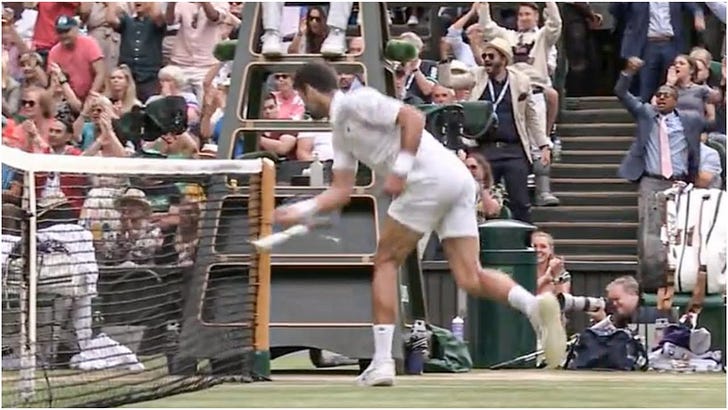But to answer the question: Because we weren’t loved properly as children!
That’s my short, jokey answer. I have much more to say on the topic, but first:
Hi, everyone! A quick heartfelt THANK YOU to my new paid subscribers. I know there are so many Substacks out there (and artists to support), so thank you so much for choosing mine. Also, you made it just in time to receive my first real paid post (although I’m sharing about half of it with the freeeee subscribers, whom I also appreciate).
Posting chapters of Resume Gap has been really fun/scary (and I’m planning on posting more), but when I started this Substack, as you’ll maybe remember, I also wanted to talk about sports and sports-adjacent things. For this post, I initially got excited to write about my obsession with a thing called a press handstand. I wanted to have fun with it and show you a bunch of videos of my #progress with this skill over the years. But then a voice in my head told me that that would probably be annoying for you. That I might come off badly, as a showoff. (Because you have to be really strong and flexible to do a press handstand.) (Another voice then entered the conversation and was like: But you’re not even that good at a press handstand, Amelia!)
Point being, it got me thinking about the parts of myself that are easier to share publicly versus the parts of myself I’d like to keep hidden from view. And, how what really bonds people together is the latter stuff—one’s shortcomings and vulnerabilities. One’s losses, you could say.
And isn’t that why, societally-speaking, we tend to root for the underdog to win and the favorite to lose? I think that this is generally true, but where things get interesting is agreeing on who is the underdog in any given match-up, competition, or, uhm, presidential race.
In the world of tennis, for example, some people actually think Djokovic (ranked World #1 currently and who, as I write this is in the process of probably breaking yet another record for Grand Slam titles held) is a kind of underdog. Maybe underdog isn’t the right descriptor. Under-appreciated, then? Or maybe, these people see him as a victim of popular opinion? (Video below is Djokovic getting booed by the crowd in this year’s Wimbledon final.)
My mother, for example, who is a big tennis fan, recently expressed sympathy for Djokovic because he wasn’t allowed into the country to play the U.S. Open last year. (At the time of last year’s Open, Djokovic was an unvaccinated foreigner and therefore, according to then federal law, he couldn’t enter the country.) Because my mom’s a Republican and I enjoy trying to destabilize her worldview, I pointed out that he could have entered the country had he gotten vaccinated, just like she’d gotten vaccinated along with her husband (and my stepdad) who is 80-years-old and has advanced Parkinson’s. (If you’re interested in a very thorough and well-written piece on Djokovic and the Covid vaccine, I highly recommend this Substack post by Matthew Willis.) As per usual, my mom appeared to brush my point of view quickly to the Doesn’t-Fit-With-My-Republican-Identity region of her brain.
It's sometimes hard to separate politics and people (see: my mother), but I’d like to think that even vaccine and other political controversies aside, I would not be a Djokovic fan. Because, in my opinion, Djokovic is an example of an Annoying Ambitious Person.
As opposed to a Nice Ambitious Person.
I know both types, and so do you most likely. But in the interest of clarity, let me briefly explain. An Annoying Ambitious Person gets their entire selfhood all wrapped up in the thing they’re doing. So that when they receive criticism on the thing they’re so good at / supposed to be so good at, or god forbid, if they lose at the thing they’re so good at, they tend to also lose their heads. They go apeshit. Sometimes this looks like denying that they lost. Sometimes they throw a big tantrum. Sometimes they hang up on you and try not to ever talk to you again (Hi, Mom). (Spoiler: Despite her best efforts, my mom and I are talking again.)
I don’t want to spend too much time listing out the moments of Djokovic’s bad behavior (and what I’d call Nadal’s exemplary behavior). More qualified people have already done this. Instead, I want to talk more about ambition. My ambition, maybe your ambition, but definitely the writer Claire Dederer’s ambition.
To be clear, I very much enjoyed Dederer’s Monsters, but in the chapter titled “Am I a Monster?” she defines ambition in a way that bothered me.
Keep reading with a 7-day free trial
Subscribe to The Art of Losing to keep reading this post and get 7 days of free access to the full post archives.





